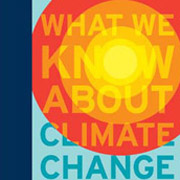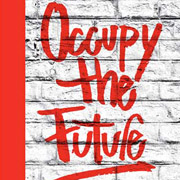Ideas Matter series at MIT explores
the Occupy movement and climate change
a report on two recent events

Ideas Matter, a joint project of Boston Review and the MIT SHASS
Department of Political Science, is a lecture series that brings Boston
Review writers together with other experts and practitioners for debate
on the challenges of our times. Here are updates on the two most recent
events, along with links to books and more information.
December 2012 event
Occupy the Future
Soon after a group of activists began demonstrating in a granite park in lower Manhattan, in September 2011, there were thousands of protesters camped out, using the park as a staging ground for acts of civil disobedience around the city. The "Occupy Wall Street" movement quickly made headlines and inspired similar protests around the world.
And now — what is the current state of the Occupy Wall Street movement? What are its goals, and are they achievable? Can the initiative move forward? These questions were among the topics covered at “Occupy the Future,” a panel discussion held at MIT on Thursday, December 6, 2012, as part of the "Ideas Matter" series, a joint project of Boston Review and the MIT Department of Political Science.
The event featured four speakers with different perspectives: journalist Chris Hedges; MIT Professor of Urban Studies and Planning J. Phillip Thompson; Stanford Professor of Philosophy Debra Satz; Occupy participant Nadeem Mazen; and, acting as moderator, Sally Haslanger, MIT Professor of Philosophy. The event also celebrated the publication of Occupy the Future, a collection of essays co-edited by Debra Satz and published by MIT Press in their Boston Review Book series.
During the discussion Satz reviewed the founding concerns of the Occupy movement—including growing corporate influence, economic inequality, and political stagnation; Hedges described the situation as “an inability on the part of government to respond rationally […] to the problems that beset us.” Mazen described the movement as “aimful,” and said his hopes were to reinvigorate the “political imagination." Thompson cited his work forming coalitions between various groups in need of job training. All the panelists found hope in projects such as Strike Debt, an Occupy offshoot that purchases consumer debt cheaply and then absolves the debtor, and in Occupy Sandy, which has been instrumental in organizing aid in New York City and environs in the aftermath of Hurricane Sandy.
Boston Review Books at MIT Press
Occupy the Future (MIT Press, 2012)
Edited by David Grusky, Doug McAdam, Rob Reich and Debra Satz
Essays on the Occupy movement, which has ignited new questions about the relationship between democracy and equality in the United States.
What We Know About Climate Change (MIT Press, 2007, 2013)
by Kerry Emmanual, MIT Professor of Atmospheric Science
"Emanuel's words are measured and authoritative. His book should help reduce the huge gap between what is understood by the scientific community and what is known by the people who need to know, the public and policymakers."
New York Times review of What We Know About Climate Change:
"The single best thing written about climate change for a general audience."
November 2012 event
Climate Change: Science and Politics
MIT Professor Kerry Emanuel of the MIT Department of Atmospheric Science spoke at another Ideas Matter event on November 7, 2012, just days after Hurricane Sandy made landfall.
Discussing the ideas in his newly re-issued Boston Review Book, What We Know About Climate Change (MIT Press, 2007, 2013), Emanuel described the current state of the field. The temperature of the earth is rising, and it correlates so strongly with human activities that there is almost no doubt as to the cause. Sea levels are rising, as are ocean surface temperatures. Severe weather events are growing more common and more deadly. It will take far more time (orders of magnitude longer) to reverse climate change than it did to cause it.
“Every discussion of climate change policy,” Emaneul said, “ought to take two graphs into account." The first graph showed showed the ranges of magnitude for severe weather at each incremental ocean surface temperature; the second showed the predictions for future temperatures and how long it would take to reverse them at several key breaking points.
In closing, Emanuel said scientists have much more work to do. There is still no way of knowing whether particular storms, like Hurricane Sandy, are an effect of the rising temperatures. “That’s a tip for you graduate students,” he joked.
Politicians also have work to do he said—particularly in the areas of risk analysis. From the construction of nuclear plants to zoning and building codes, policy must now take climate science into account, more than ever, Emanuel said, and over the long-term, politicians must consider the costs of environmental regulation against the cost of frequent and ever-more-intense severe weather.
Suggested Links
About the Boston Review / MIT Political Science collaboration
MIT SHASS | Department of Political Science
Occupy the Future (MIT Press, 2012)
The Occupy Wall Street movement has ignited new questions about the relationship between democracy and equality in the United States.
What We Know About Climate Change (MIT Press, 2007, 2013)
by Kerry Emmanual, MIT Professor of Atmospheric Science
"Emanuel's words are measured and authoritative. His book should help reduce the huge gap between what is understood by the scientific community and what is known by the people who need to know, the public and policymakers." — James Hansen, NASA Goddard Institute for Space Studies
"The single best thing written about climate change for a general audience."
New York Times review
Story prepared by MIT SHASS Communications
Editorial and Design Director: Emily Hiestand
Reporter: Daniel E. Pritchard, Boston Review


